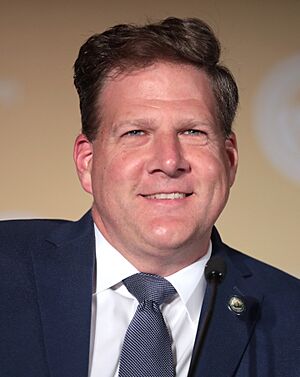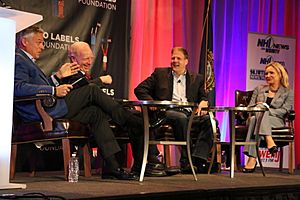Chris Sununu facts for kids
Quick facts for kids
Chris Sununu
|
|
|---|---|

Sununu in 2022
|
|
| 82nd Governor of New Hampshire | |
| In office January 5, 2017 – January 9, 2025 |
|
| Preceded by | Chuck Morse (acting) |
| Succeeded by | Kelly Ayotte |
| Member of the New Hampshire Executive Council from the 3rd district | |
| In office January 3, 2011 – January 3, 2017 |
|
| Preceded by | Beverly Hollingworth |
| Succeeded by | Russell Prescott |
| Personal details | |
| Born |
Christopher Thomas Sununu
November 5, 1974 Salem, New Hampshire, U.S. |
| Political party | Republican |
| Spouse |
Valerie Sununu
(m. 2001) |
| Children | 3 |
| Parents | John H. Sununu (father) Nancy Sununu (mother) |
| Relatives | John E. Sununu (brother) |
| Education | Massachusetts Institute of Technology (BS) |
Christopher Thomas Sununu (/səˈnuːnuː/ sə-NOO-noo; born November 5, 1974) is an American politician and engineer. He served as the 82nd governor of New Hampshire from 2017 to 2025.
A member of the Republican Party, Sununu comes from a family involved in politics. His father, John H. Sununu, was also a governor of New Hampshire and a White House Chief of Staff. His older brother, John E. Sununu, served as a U.S. representative and senator.
Chris Sununu studied civil and environmental engineering at the Massachusetts Institute of Technology (MIT). Before becoming governor, he was the chief executive officer of the Waterville Valley Resort in New Hampshire. He also served on the New Hampshire Executive Council from 2011 to 2017.
Sununu was first elected governor in 2016. He was reelected three more times, in 2018, 2020, and 2022. He is one of only two governors in New Hampshire history to be elected to a fourth term. During his time as governor, he focused on managing state money carefully, cutting taxes, and supporting businesses.
Sununu is considered a moderate Republican. This means he holds a mix of views, sometimes supporting LGBT rights and sometimes taking more conservative stances on other social issues. He decided not to run for a fifth term in 2023. Kelly Ayotte was elected to take his place.
Contents
Early Life and Education
Growing Up in New Hampshire
Chris Sununu was born on November 5, 1974, in Salem, New Hampshire. His parents are John H. Sununu, who was a former New Hampshire Governor, and Nancy Sununu, who was the First Lady of New Hampshire. He is one of eight children in his family. His family has roots in Lebanon and a Greek Orthodox Christian background.
School and College Years
Sununu graduated from Thomas Jefferson High School for Science and Technology in Virginia in 1993. He then went on to study at the Massachusetts Institute of Technology (MIT). In 1998, he earned a Bachelor of Science degree in civil and environmental engineering.
Early Career
Working as an Engineer
After college, Sununu worked as an environmental engineer. He designed systems to clean up waste sites. His work involved cleaning soil and groundwater, designing wastewater treatment plants, and planning landfills. In 2002, he became an "engineer in training" in California.
Leading a Ski Resort
In 2010, Sununu led a group of investors who bought the Waterville Valley Resort. He became the chief executive officer (CEO) of the resort. This job meant he was in charge of over 700 employees in the White Mountains area of New Hampshire.
New Hampshire Executive Council
Serving the State
From 2011 to 2017, Chris Sununu was an elected member of the five-person Executive Council of New Hampshire. This council works with the governor to make important decisions for the state.
Planning for Roads
As a member of the Executive Council, Sununu helped create the 10-Year Highway Plan for 2017–2026. This plan was a guide for how the state would manage its roads and transportation projects. It also considered how much money would be available from federal funding.

Governor of New Hampshire
Winning Elections
2016 Election
In the 2016 election for governor, Sununu won against the Democratic candidate, Colin Van Ostern. He received 48.8% of the votes, while Van Ostern received 46.6%.
2018 Election
Sununu was reelected in 2018. He defeated Democratic candidate Molly Kelly with 52.8% of the votes.
2020 Election
In 2019, Sununu announced he would run for a third term as governor. He won the election with 65.1% of the votes, defeating Democratic candidate Dan Feltes. This was the highest number of votes ever received by a New Hampshire governor candidate.
2022 Election
Sununu ran for a fourth term as governor in 2022. He won with 57.0% of the votes, defeating Democratic candidate Thomas Sherman.
Time as Governor
COVID-19 Pandemic Response
During the COVID-19 pandemic, Sununu put a statewide mask mandate in place in November 2020. He also asked President Joe Biden and FEMA for emergency help in December 2021 when COVID-19 cases increased in New Hampshire.
Protecting Rights
In 2017, Sununu signed a bill that allowed people to carry a handgun without a permit in New Hampshire. In 2018, he signed two bills to protect LGBT rights. One bill stopped discrimination based on gender identity in housing and jobs. The other banned conversion therapy for minors.
In July 2024, Sununu signed three bills that limited some transgender rights. One bill stopped trans girls from playing in girls' sports in grades 5 to 12. Another banned certain gender-affirming surgeries for minors. The third bill required teachers to let parents opt their children out of lessons about "sexual orientation, gender, gender identity, or gender expression."
Law Enforcement Changes
After the murder of George Floyd, Sununu created a commission to look at police training and how police interact with communities. This commission made recommendations, including that all police officers in the state should wear body cameras. Sununu supported these recommendations.
Political Views
Economic Policies
Sununu is known for being "fiscally conservative." This means he believes in careful spending of government money and lower taxes. He has supported tax cuts for businesses and reducing property taxes. He also wanted to get rid of New Hampshire's tax on dividends and interest income.
Sununu has supported giving state-funded "school choice vouchers" to students from disadvantaged or low-income families. These vouchers can be used for religious and private schools.
Energy and Environment
Sununu has focused on energy policies for New Hampshire. He proposed creating a new state Department of Energy to make government more efficient. One of his goals for this department was to develop offshore wind energy along New Hampshire's coast.
Views on Donald Trump
In 2016, Sununu supported Donald Trump for president. He continued to support Trump in the 2020 election. After the 2020 election, Sununu accepted Joe Biden's victory and became a critic of Trump. However, he said he would still vote for Trump if he became the Republican nominee in 2024. In December 2023, Sununu endorsed Nikki Haley for president. After Trump became the likely Republican nominee, Sununu officially endorsed him in March 2024.
Personal Life

Chris Sununu met his wife, Valerie, in college, and they married in 2001. They have three children: Calvin, Edith, and Leonardo. The family lives in Newfields, New Hampshire.
Sununu enjoys skiing and playing rugby. In 1998, he completed a five-month hike of the Appalachian Trail, which goes from Maine to Georgia. In September 2024, Sununu helped save a choking person at a lobster roll eating contest by performing the Heimlich maneuver.
Images for kids
Electoral History
Executive Council Elections
- In 2010, Sununu won his first term on the Executive Council, defeating Beverly Hollingworth.
- In 2012, he won his second term, defeating Bill Duncan.
- In 2014, he won his third term, defeating Robin McLane.
Gubernatorial Elections
| Party | Candidate | Votes | % | |||
|---|---|---|---|---|---|---|
| Republican | Chris Sununu | 354,040 | 48.84% | |||
| Democratic | Colin Van Ostern | 337,589 | 46.57% | |||
| Libertarian | Max Abramson | 31,243 | 4.29% | |||
| Total votes | 724,863 | 100.00% | ||||
| Republican gain from Democrat | ||||||
| 2018 New Hampshire gubernatorial election | |||||
|---|---|---|---|---|---|
| Party | Candidate | Votes | % | ±% | |
| Republican | Chris Sununu (incumbent) | 302,764 | 52.78% | +3.94% | |
| Democratic | Molly Kelly | 262,359 | 45.74% | -0.83% | |
| Libertarian | Jilletta Jarvis | 8,197 | 1.43% | -2.88% | |
| Write-in | 282 | 0.05% | -0.23% | ||
| Total votes | 573,602 | 100.0% | |||
| Republican hold | |||||
| 2020 New Hampshire gubernatorial election | |||||
|---|---|---|---|---|---|
| Party | Candidate | Votes | % | ±% | |
| Republican | Chris Sununu (incumbent) | 516,609 | 65.12% | +12.34% | |
| Democratic | Dan Feltes | 264,639 | 33.36% | -12.38% | |
| Libertarian | Darryl W. Perry | 11,329 | 1.43% | 0.00% | |
| Write-in | 683 | 0.09% | +0.04% | ||
| Total votes | 793,260 | 100.0% | |||
| Republican hold | |||||
| 2022 New Hampshire gubernatorial election | |||||
|---|---|---|---|---|---|
| Party | Candidate | Votes | % | ±% | |
| Republican | Chris Sununu (incumbent) | 352,813 | 56.98% | -8.14% | |
| Democratic | Tom Sherman | 256,766 | 41.47% | +8.11% | |
| Libertarian | Kelly Halldorson | 5,071 | 0.82% | N/A | |
| Libertarian | Karlyn Borysenko | 2,772 | 0.45% | N/A | |
| Write-in | 1,713 | 0.28% | +0.19% | ||
| Total votes | 619,135 | 100.0% | |||
| Republican hold | |||||
See also
 In Spanish: Chris Sununu para niños
In Spanish: Chris Sununu para niños
 | Delilah Pierce |
 | Gordon Parks |
 | Augusta Savage |
 | Charles Ethan Porter |


